Business Featured
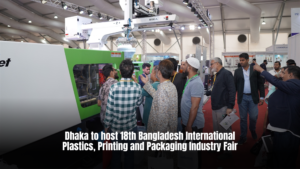
Dhaka to host 18th Bangladesh International Plastics, Printing and Packaging Industry Fair
The 18th Bangladesh International Plastics, Printing and Packaging Industry Fair (IPF-26) will take place from January 28 to 31, 2026, at the International Convention City Bashundhara (ICCB) in Dhaka. The event is jointly organised by the Bangladesh Plastic Goods Manufacturers & Exporters Association (BPGMEA) and Yorkers Trade & Marketing Service Co., Ltd., with show management by Chan Chao International Co., Ltd. The fair will feature 400 exhibitors across 800 booths, representing over 18 countries and regions. Exhibitors will occupy 18,000 square metres of space, making it one of the largest industrial gatherings in Bangladesh. Countries participating include Austria, China, India, Indonesia, Italy, Malaysia, Mexico, Pakistan, Saudi Arabia, Singapore, South Korea, Taiwan, Thailand, Turkey, the United Arab Emirates, the United States, Vietnam, and Bangladesh. IPF Bangladesh 2026 presents a full value-chain showcase covering core production technologies, materials, and downstream applications, enabling visitors to evaluate complete manufacturing solutions in one venue. Organisers said the focus is on demonstrating how plastics can support sustainable farming practices and help address climate and food security challenges. Bangladesh’s plastic industry is valued at $2.99 billion and is expanding at an annual growth rate of more than 20 percent. Export earnings reached $2.2 billion, reflecting the sector’s growing role in the national economy. To support this momentum, the commerce ministry has declared paper and packaging as the “Product of the Year 2026”. The ministry has also introduced development policies, skills training programs, and seminars to strengthen the “Made in Bangladesh” brand and improve competitiveness in global markets. The exhibition will cover several industry segments, including plastics processing machinery, printing and packaging machinery, raw materials, recycling and reprocessing technologies, and finished packaging products. Industry stakeholders said the fair comes at a crucial time, as Bangladesh seeks to expand its industrial base and integrate more deeply into global supply chains. The event is expected to attract buyers, suppliers, and innovators from multiple regions, reinforcing Dhaka’s role as a hub for industrial innovation. Organisers emphasized that IPF-26 will not only showcase machinery and materials but also highlight the industry’s contribution to agriculture and sustainability. With participation from 18 countries and strong government backing, the fair is positioned as a key platform for advancing Bangladesh’s plastics and packaging sector. The 18th Bangladesh International Plastic, Printing and Packaging Industrial Fair will run for four days at ICCB, bringing together international exhibitors, local manufacturers, and policymakers to discuss and display innovations shaping the future of plastics and packaging in Bangladesh. Visiting hours are set from 11:00 am to 7:00 pm, with the final day closing at 6:30 pm. Regulations specify that visitors under 16 years of age will not be permitted. Written by Nibir Ayaan
Read More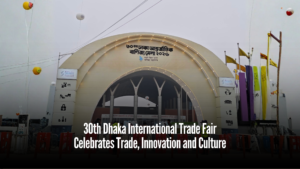
30th Dhaka International Trade Fair Celebrates Trade, Innovation and Culture
The 30th edition of the Dhaka International Trade Fair (DITF) 2026 is underway at the China-Bangladesh Friendship Exhibition Center (CBFEC) in Purbachal on the outskirts of Dhaka. Commerce Adviser Sk Bashir Uddin inaugurated the month-long event on January 3. Originally scheduled to open on January 1, the inauguration was deferred to January 3 following the government’s declaration of three days of national mourning over the death of Khaleda Zia, former prime minister and chairperson of Bangladesh Nationalist Party. The fair has been jointly organized by the Ministry of Commerce and the Export Promotion Bureau (EPB). This year, a total of 324 pavilions, stalls, and restaurants have been allocated to local producer-exporter organisations, business establishments and foreign companies. Alongside Bangladeshi firms, 11 companies from six countries — India, Turkey, Singapore, Indonesia, Hong Kong and Malaysia— are participating in the fair. A wide range of products are being displayed at the fair, including local textiles, machinery, carpets, cosmetics and beauty aids, electrical and electronics goods, furniture, jute and jute products, household items, leather and artificial leather goods and footwear, sports goods, sanitaryware, toys, stationery, crockery, plastic items, melamine polymers, herbal and toiletry products, imitation jewellery, processed food, fast food, handicrafts, home décor and more. However, ticket prices are set at Tk 50 for adults and Tk 25 for children under 12. Freedom fighters, persons with disabilities, and those injured in the July movement are allowed free entry upon showing valid identification cards. The fair remains open daily from 9:55 am to 9:50 pm, and until 10:00 pm on weekly holidays. To ensure smooth transportation for visitors, more than 200 dedicated BRTC shuttle buses are operating daily from Kuril Bishwaroad, Farmgate (Khejur Bagan/Khamarbari), Narayanganj, and Narsingdi, starting from 8:00 am. The last shuttle bus from the fairground departs at 11:00 pm. Written By Rafikul Islam
Read More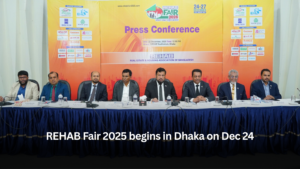
REHAB Fair 2025 begins in Dhaka on Dec 24
The housing sector in Bangladesh is preparing for its biggest annual showcase as REHAB Fair 2025 opens its doors on December 24 at the Bangladesh China Friendship Conference Center (BCFCC) in Dhaka. Running until December 27, the fair promises to bring together developers, financiers, and buyers under one roof, offering a rare chance to explore the breadth of the country’s real estate industry. With 220 stalls, the event is designed to highlight the scale and diversity of the housing market. Four diamond sponsors, seven gold sponsors, 10 co-sponsors, 14 building materials companies, and 12 financial institutions will take part, reflecting the sector’s growing reach. The announcement came during a press conference at the Cirdap auditorium in Dhaka, where REHAB President Md Wahiduzzaman outlined the fair’s significance. Senior leaders, including Liaquat Ali Bhuiyan, Mohammad Akter Biswas, and other directors joined him, underscoring the collective effort behind the event. For Wahiduzzaman, the fair is more than a showcase. He described REHAB as the government’s key partner in infrastructural development, stressing its role in ensuring safe housing for present and future generations. The president emphasised fairness and equality in housing opportunities, calling for policies that enable developers to serve citizens across income levels. He pointed to the new Detailed Area Plan (DAP) and Dhaka Metropolitan Building Regulations 2025 as milestones that have removed longstanding complexities and inequalities. These reforms, he said, will restore confidence among real estate businesses and stabilise the sector in the long term. Crowds are expected to swell during the three-day holiday period, and organisers anticipate strong public interest. Wahiduzzaman described the fair as a trusted platform where buyers and developers can meet directly. The chance to compare project quality, location, facilities, and investment potential across so many institutions, he noted, is almost impossible outside this event. Beyond property sales, the fair will offer visitors access to housing loans, financial services, and modern construction materials. Buyers will be able to examine every aspect of home ownership in one place, from financing to building supplies, making decision-making easier and more transparent. The REHAB Housing Fair has a long history. First held in Dhaka in 2001, this year marks its 27th edition in the capital. Sixteen fairs have also been held successfully in Chattogram, while international editions have taken place since 2004. Twelve fairs have been organised in the United States, alongside events in the United Kingdom, Dubai, Italy, Canada, Sydney, and Qatar. These overseas ventures have helped expatriates secure housing back home while generating foreign currency for Bangladesh. The fairs, organisers say, have enriched the economy and fostered growth in both the housing industry and related sectors. Sponsors play a central role in the fair’s success. Diamond sponsors include Asian Town Development Ltd, Eastern Housing Ltd, Sheltech Ltd, and Tropical Homes Ltd. Gold sponsors range from Asian Lands Development Ltd to Northsouth Consortium Ltd, while 10 co-sponsors add further depth to the line-up. The co-sponsor institutions are: 1. Anwar Landmark Ltd, 2. Assure Development and Design Ltd, 3. Comprehensive Holdings Ltd, 4. Cube Holding Ltd, 5. Onward Development Ltd, 6. Platinum Holdings Ltd, 7. Sena Kalyan Constructions and Developments Ltd, 8. The Structural Engineers Ltd, 9. Subarna Bhumi Housing Ltd, 10. TM Asset Ltd. Together, they represent the breadth of the industry, from established developers to emerging firms. The inaugural session will be held at the Hall of Fame of the Bangladesh China Friendship Conference Centre, with RAJUK Chairman Engineer Md Riazul Islam as chief guest and National Housing Authority Chairman Ferdousi Begum as special guest. Visitors will be welcomed after the ceremony on December 24, with entry hours from 10am to 9pm on subsequent days. Tickets remain accessible, with single entry priced at Tk 50 and multiple entry at Tk 100. The Tk 100 ticket allows five visits during the fair, making it attractive for serious buyers. All proceeds will be channelled into corporate social responsibility projects for the underprivileged, reinforcing the fair’s social commitment. Each ticket also includes free refreshments, while daily raffle draws at 9pm promise valuable prizes, adding excitement to the evenings. Written by Nibir Ayaan
Read More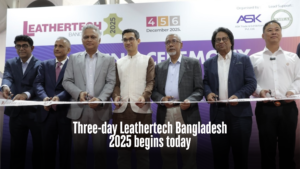
Three-day Leathertech Bangladesh 2025 begins in Dhaka
Leathertech Bangladesh 2025, an international trade show, began in Dhaka on December 4, showcasing raw materials, machinery, chemicals, accessories and components for the leather sector alongside finished leather, travel goods and both leather and non-leather footwear. More than 200 local and foreign exhibitors are taking part in the event, which occupies 15,000 square metres at the International Convention City Bashundhara in the capital. The expo is being organised by ASK Trade & Exhibitions Pvt Limited with the support of the Leathergoods and Footwear Manufacturers & Exporters Association of Bangladesh (LFMEAB). Chowdhury Ashik Mahmud Bin Harun, executive chairman of the Bangladesh Investment Development Authority (BIDA), inaugurated the expo as chief guest, while Syed Nasim Manzur, president of LFMEAB, attended as special guest. Leaders of industry associations from Bangladesh, China, India and Pakistan were also present, reflecting the regional significance of the event. Leathertech Bangladesh began its journey 11 years ago as a technology platform created to bring innovations in footwear, travel goods and allied manufacturing from across the world closer to local producers. Over the years, it has become the most preferred platform for exploring and expanding opportunities in Bangladesh’s leather, footwear and travel goods sector. In the past decade, it has grown into the country’s leading networking platform for the leather industry. “The 11th edition will feature pavilions from the Council for Leather Exports India (CLE), Pakistan Tanners Association (PTA), India Footwear Components Manufacturers Association (IFCOMA), and the Confederation of Indian Footwear Industries (CIFI), along with a pavilion from the Guangdong Shoe-Making Machinery Association (GSMA) of China,” said Tipu Sultan Bhuiyan, managing director of ASK Trade & Exhibitions Pvt Ltd. “Most of the leading industry associations are supporting the event, with LFMEAB providing the lead support. Nearly 200 exhibitors from eight countries, including Bangladesh, are participating in the largest technology trade show for the leather sector in the country.” “Bangladesh’s leather industry now stands on the threshold of realising its full potential. An exhibition like ‘Leathertech’ is not merely a showcase; it is a remarkable initiative to propel the sector towards that ultimate potential,” the BIDA executive chairman said at the event. “Such events signal that the leather industry is ready to enter a new chapter. I firmly believe that with coordinated efforts between the public and private sectors, Bangladesh’s leather industry will advance much further.” The LFMEAB president, Syed Nasim Manzur, said: “The leather industry of Bangladesh is now at a crossroads to accelerate export-oriented manufacturing. To move to the next level, policy liberalisation is essential.” “If we can strengthen the right connections between our country and neighbouring economies, technological development within the leather sector will progress even faster,” he said. The leather and footwear industry is Bangladesh’s second-largest export sector after readymade garments, contributing approximately 3% of the global leather goods market and meeting nearly 10% of global leather demand. Designated as a priority sector for export diversification under the Industry Policy 2022, the industry is positioning itself as a global sourcing hub, backed by a cost-competitive workforce, abundant raw materials and targeted policy incentives. Bangladesh’s leather and footwear exports continued their recovery in October FY25–26, posting a 9.7% year-on-year growth, reaching $591.5 million compared with $539.4 million last year, according to data from the Export Promotion Bureau (EPB). Gates of the three-day showcase will remain open to business visitors free of charge from 11am to 7pm every day. Written By Nibir Ayaan
Read More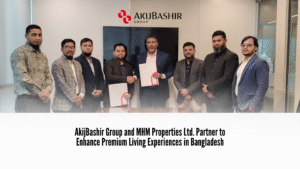
AkijBashir Group and MHM Properties Ltd. Partner to Enhance Premium Living Experiences in Bangladesh
AkijBashir Group has signed a strategic partnership with MHM Properties Ltd. to strengthen collaboration in providing premium building material solutions and enhancing customer value in Bangladesh’s real estate and construction sectors. The Memorandum of Understanding (MoU) was signed on October 14, 2025, marking a significant step toward integrating design excellence, innovation, and quality in modern living spaces. In the deal, MHM Properties Ltd. will promote and sell the top brands of AkijBashir, namely, Akij Ceramics, ROSA Sanitaryware, Akij Particle Board Mills Ltd., Akij Door, Akij Bathware, and AkijBashir Glass using its own network and outlets. The partnership is expected to provide the tiles, sanitaryware, bathware, boards, doors and glasses, as a one-stop solution in the world-class quality and design of their products, with the aim of having a trusted partner. Directors of MHM Properties Ltd. Mr. Mahmudul Hasan Tonmoy, Director, Akij Ceramics Ltd. Mr. Mohammed Ashraful Haque, General Manager, Sales, and AkijBashir Group Chief Operating Officer were the signatories of the MoU. At the signing, Mr. Khourshed Alam remarked that we are happy to collaborate with MHM Properties Ltd. in order to increase the outlets of the various product lines of AkijBashir. This alliance is indicative of our mission to combine design, innovation, and quality to augment living standards in the contemporary setting in Bangladesh. Mr. Mahmudul Hasan Tonmoy also added that this is a joint venture that we want to add more value and ease to our customers as we provide a broad spectrum of high-end building materials and finishes that are both fashionable and timeless. The partnership brings a fresh start, and combining expertise and innovation, the coalition will define exquisite, sustainable, and inspirational homes throughout Bangladesh.
Read More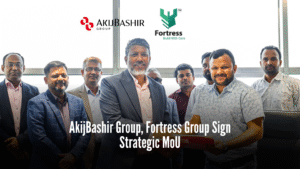
Fortress Group to Feature Leading Product Lines of AkijBashir Group
AkijBashir Group has recently teamed up with Fortress Group to expand the reach of high-quality building materials and improve the standard of premium living in Bangladesh. The two companies signed a strategic Memorandum of Understanding (MoU) at a programme on October 9. The MoU outlines plans for enhanced cooperation between the two companies, with Fortress Group set to feature AkijBashir’s leading product lines. Products from Akij Ceramics, ROSA Sanitaryware, Akij Board, Akij Door, and Akij Glass will be featured by Fortress. As part of the collaboration, customers will gain access to a complete range of tiles, sanitaryware, bathware, boards, doors, and glass products. Both companies said the partnership is aimed at providing an integrated offering for modern construction and interior design needs. AkijBashir Group Chief Operating Officer Mohammod Khourshed Alam and Fortress Group Chairman Lutfur Rahman signed the MoU in the presence of senior officials from both organisations. “We are delighted to collaborate with Fortress Group in expanding the reach of AkijBashir’s premium product portfolio to a broader customer base,” said Alam. Rahman said the partnership would allow Fortress Group to introduce a wider selection of quality products to customers, enhancing convenience and lifestyle. The two companies said the agreement marks the beginning of a new chapter in their efforts to support the creation of elegant, sustainable, and modern living spaces across the country. Written by Nibir Ayaan
Read More
Paint Bangladesh 2025, an expo on paint industry, set to begin on September 25
Paint Bangladesh 2025, an exhibition on paint industry, is set to take place from September 25-27 this year at the International Convention City Bashundhara (ICCB), Dhaka. Organised by Rainbow Exhibition & Event Management Services Ltd., the expo is positioned as the largest and most specialized platform in South Asia for surface technology, chemical engineering, and material innovation. Paint Bangladesh 2025 is not just an exhibition; it is a technology transfer platform, the organisers said. Global leaders and local manufacturers will showcase cutting-edge solutions in: Resins, pigments, and additives engineered for higher durability, colour stability, and environmental performance. Advanced laboratory, production, and packaging equipment designed to optimise efficiency, reduce wastage, and enhance precision in coating applications. Testing and measuring instruments that ensure quality assurance and compliance with international standards. High-performance adhesives and sealants, crucial for construction, ceramics, and industrial applications where strength and longevity matter. Sustainable chemical innovations, including low-VOC (volatile organic compound) and eco-friendly formulations aligning with global green building requirements. These technologies are directly relevant for industries beyond paint, where surface coating, glaze chemistry, and bonding materials are integral to product quality. The event goes beyond exhibits. A series of seminars, technical sessions, and product demonstrations will highlight: Breakthroughs in nanotechnology for coatings. Innovations in chemical engineering for durability and performance. Market insights on Bangladesh’s rapidly expanding construction and real estate sectors. These sessions are designed to create direct dialogues between manufacturers, researchers, engineers, architects, and buyers, enabling collaboration across the entire value chain. In addition, a dedicated space called the ‘Future Paint Corner’ will facilitate the exchange of ideas on future paint systems, integrated manufacturing technologies, and innovative paint experiences of the future. Key Information Venue: International Convention City Bashundhara (ICCB), Dhaka Dates & Time: September 25 & 26 – 10 am to 7 pm September 27 – 10 am to 6:30 pm Organisers: Rainbow Exhibition & Event Management Services Ltd. and Bangladesh Paint Manufacturers’ Association (BPMA) The exhibition is open to trade and business visitors only. For the ceramic industry, this event represents an unmissable opportunity to integrate advanced coating solutions, eco-friendly materials, and high-performance adhesives into their production lines. Ceramic Bangladesh strongly encourages all stakeholders — from manufacturers to designers — to attend this landmark event and witness firsthand the future of paints, coatings, and chemicals in Bangladesh. Written by Arefin Murad
Read More
Akij Tableware Announces Bangladesh’s First Food Plating Reality Show, “Art of Plating: Season 2” Offering 20,00,000 BDT in Prizes
Following the overwhelming success and audience acclaim of its first season, Akij Tableware is proud to announce the return of Bangladesh’s first-ever food plating reality show, “Akij Tableware Art of Plating,” with the launch of its second season. The show aims to discover the nation’s most talented food plating artist, with the winner taking home a grand prize of 10,00,000 BDT. In addition to the grand prize, the competition offers substantial rewards for the runners-up. The first runner-up will receive 5,00,000 BDT, while the second runner-up will be awarded 3,00,000 BDT. Furthermore, the top 30 contestants will be honored with a variety of prizes, including crests, certificates, culinary courses, and exclusive dinner sets from Akij Tableware, culminating in a total prize pool of 20,00,000 BDT. Commenting on the initiative, Chief Operating Officer of AkijBashir Group Md. Khorshed Alam shared, “After receiving an enthusiastic response in season one, we have expanded this season to encompass a broader audience, uniting plating artists from all corners of Bangladesh. Our goal is to present the unique culture and storytelling embedded in food plating art to the world and enrich this creative field.” The highly anticipated reality show will be broadcast on NTV, Channel i, and Deepto Television, with availability on popular OTT platform Chorki. Participants are required to submit photos of their best food plating through the official website. From there, experienced and renowned chefs will select the top 30 contestants based on their creativity and skills, providing them with the opportunity to showcase their talents on national television. At a press conference held on Tuesday, February 4, 2025 at a renowned hotel in the country, the chief judge of the show Chef Daniel C. Gomez, Head of Marketing of AkijBashir Group Md. Shahriar Zaman, and Chief Operating Officer of the company Md. Khorshed Alam, and officials of Akij Tableware were present. They shared insights into the upcoming season, underscoring its mission to celebrate food plating as an art form and provide a platform for local talent to shine on a national stage.
Read More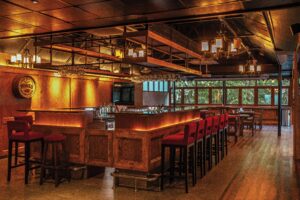
Business – A Glimpse of Timeless Elegance in the British-Pub Revival named BAGHA Club
Located in the Gulshan, Dhaka, the newly renovated bar of The British Aid Guest House Association (BAGHA) Club is a renovation project designed by Zero Inch Interiors Ltd. The British-Pub-inspired interior design of the BAGHA Club’s bar is conceptualised to transform the space into a comfortable and cozy space. The guiding vision for the interior design of the bar has aimed to offer club members a sanctuary – a place where they could briefly detach from their demanding routines, relax, and recharge in a welcoming atmosphere following a day of work. The British Aid Guest House Association (BAGHA) Club was established in 1979. It is a part of the British High Commission estate and proudly serves a wonderfully diverse mix of European Union nationals. Among various amenities that the club offers, including a tennis court, children’s play area, all-day restaurants, swimming pools, and a library, the bar stands out as a focal point of social interaction and relaxation. Recently undergoing a remarkable renovation by the design team of Zero Inch Interiors Ltd., the British-Pub-inspired interior now exudes a timeless charm that seamlessly blends the traditional British pub environment with modern aesthetics. The Concept Behind the Renovation Project The interior embodies a distinctive British Pub aesthetic, interpreting traditional British elements in a contemporary style. Sharing the concept of the BAGHA club, Architect Ariful Islam says, “The idea was to renovate the bar in resemblance to British pubs, while, at the same time, doing it with minimal intervention to make the space inviting, cozy, and long-lasting.” A wall was dismantled, which, in fact, made the most visible change and expanded the space. This step in design resulted in lightening up the atmosphere of the club. After rethinking the space, the modified open-plan layout ensured that the bar counter was transformed into a rectangular shape, making it interactive and interesting. The renovation overall, therefore, achieves a delicate balance between reflecting the charm of British pubs and infusing a modern, vibrant dynamism into the space. Challenges in the Interior Design Designed by architect Muhammad Ariful Islam and his team in a remarkably brief two-month timeframe, this 2800-square-foot contemporary renovation stands as a one-of-a-kind endeavour in Bangladesh. “We’re confined to some challenges as the site was a rental space, which dictated that major demolitions were not permissible here,” added the architect. The primary challenges faced by the design team during the construction phase of the bar interior design were centred around the principles of minimal design intervention, budget constraints, and the necessity to execute the design within a notably short timeframe. Balancing all these constraints required careful consideration and strategic decision-making to ensure the success and execution of the envisioned space. Color Palette and Materiality In this interior project, wood has been selected as the primary construction material, complemented by glass and metal details. The utilisation of wooden panels, intricate carvings, and carefully curated lighting collectively contribute to creating a cozy, warm, and inviting ambiance. Furthermore, the extensive collection of bar accessories enhances the overall visual appeal, adding a layer of sophistication to the space. A new bar counter along with bar stools have been incorporated into the bar interior design, and this rendition perfectly completes the bar. The stunning stools with red-wine upholstery add a dash of colour to the interior and complement the wooden tone. Lastly, the sophisticated chandeliers add a dramatic charm to the entire British Pub ambiance. Architect Ariful Islam explains, “We preferred Challenges in the Interior Design Designed by architect Muhammad Ariful Islam and his team in a remarkably brief two-month timeframe, this 2800-square-foot contemporary renovation stands as a one-of-a-kind endeavour in Bangladesh. “We’re confined to some challenges as the site was a rental space, which dictated that major demolitions were not permissible here,” added the architect. The primary challenges faced by the design team during the construction phase of the bar interior design were centred around the principles of minimal design intervention, budget constraints, and the necessity to execute the design within a notably short timeframe. Balancing all these constraints required careful consideration and strategic decision-making to ensure the success and execution of the envisioned space. Color Palette and Materiality In this interior project, wood has been selected as the primary construction material, complemented by glass and metal details. The utilisation of wooden panels, intricate carvings, and carefully curated lighting collectively contribute to creating a cozy, warm, and inviting ambiance. Furthermore, the extensive collection of bar accessories enhances the overall visual appeal, adding a layer of sophistication to the space. A new bar counter along with bar stools have been incorporated into the bar interior design, and this rendition perfectly completes the bar. The stunning stools with red-wine upholstery add a dash of colour to the interior and complement the wooden tone. Lastly, the sophisticated chandeliers add a dramatic charm to the entire British Pub ambiance. to choose wood as the primary material because when warm light falls on wood, it creates a golden effect. The red hues further enhance the vibrancy and liveliness of the space.” The ceiling is kept simple and devoid of (intricate) details, maintaining a blackout effect. The flooring features darker tones with rustic tiles adorned with wooden patterns. This careful selection of materials and design elements contributes to the overall coherence and elegance of the bar’s interior. Zero Waste Design Philosophy One mentionable feature of this renovation is the Zero Waste Design Philosophy of the design team. In adherence to this design philosophy, they embraced creative methods to repurpose furniture in the design of this bar. Through a commitment to sustainability, repurposed and recycled furniture, along with other items, were integrated into the overall design. Each furniture piece underwent resizing and repainting to align with current functional needs. Another key aspect of the sustainability initiative involved the replacement of all damaged glass windows, which were previously allowing rainwater to infiltrate the interior. By incorporating new, weather-resistant windows, they not only addressed the structural issues but also contributed to the energy efficiency of the
Read More
